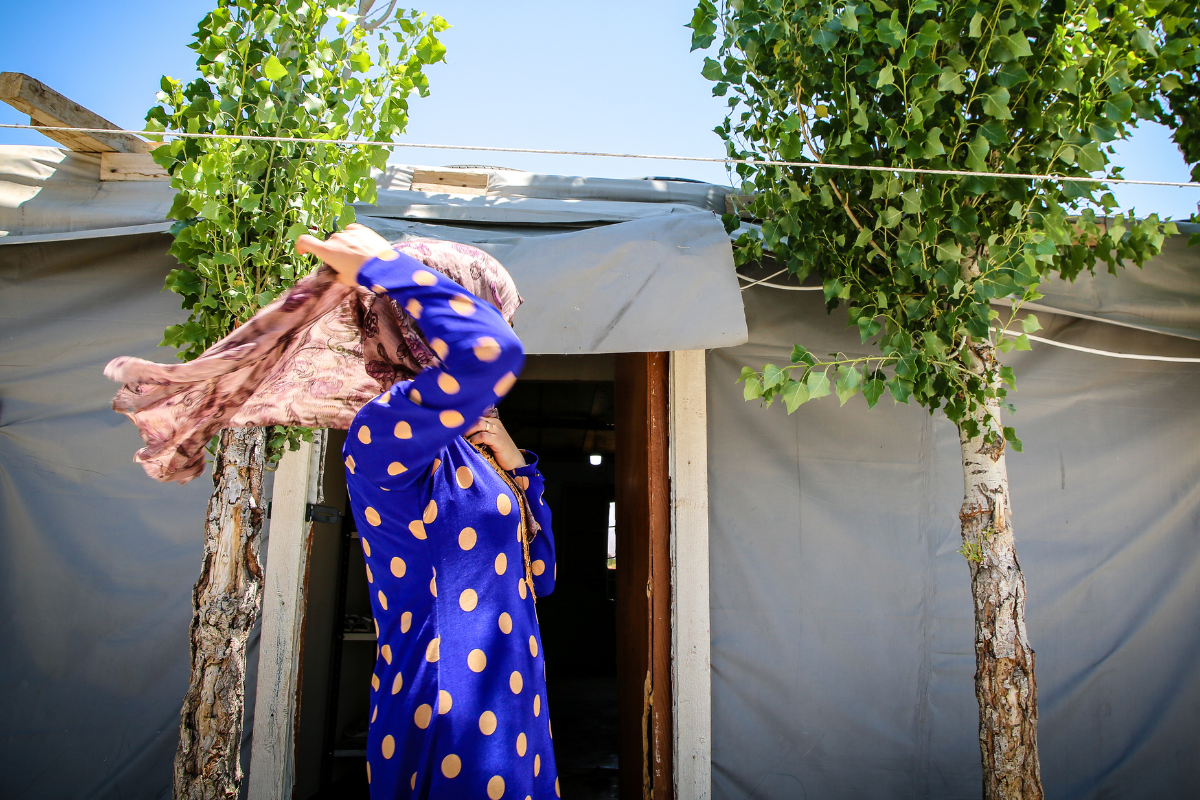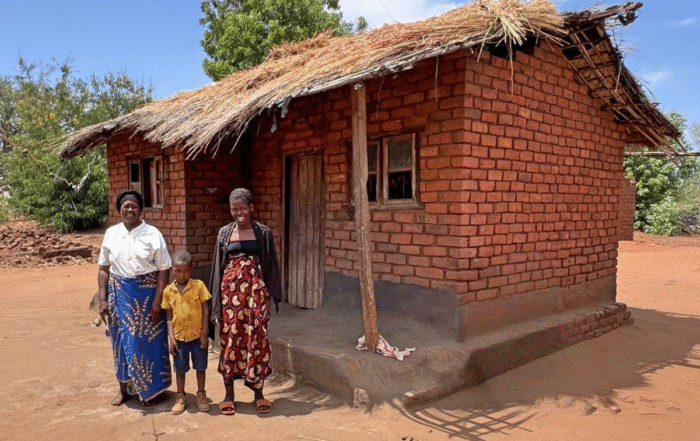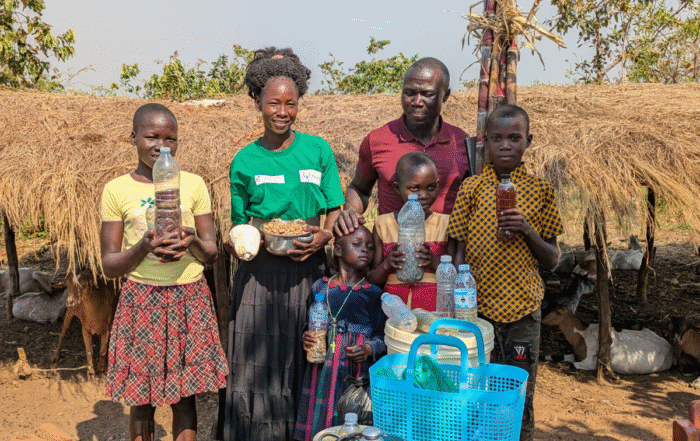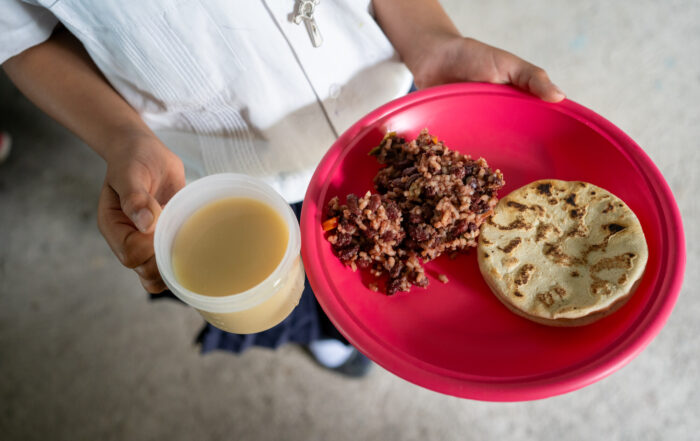Lilia’s Journey to Self-Confidence
November 25, 2025
Lilia’s Journey to Self-Confidence
November 25, 2025

The 16 Days of Activism Against Gender-Based Violence campaign is an annual event focused on raising awareness and calling for action to end violence against women and girls. In our work, World Renew has heard the testimonies of women who have endured beatings at the hands of their husbands, girls not allowed to attend school and forced into early marriages, women who have been made to feel useless because of the insults of their communities, and many other instances of injustice perpetrated against women and girls.
Lilia* has known the pain of abuse. In Syria, where she lives, a civil war began in 2011 with protests against the Assad regime. “We lost our home very suddenly in the war, as a shell fell on it,” shares Lilia, who was in Grade 6 at the time. “We came out from under the rubble in complete shock.”
Displaced, Lilia’s family set up a tent that provided insufficient shelter from the rain and cold. “We lived through harsh days in these conditions, until my mother had to sell her gold so that we could buy two sheep . . . hoping that it would provide us with a source of food,” says Lilia. But still, she had to quit school to help support her family. And although Lilia and her mother worked long hours in the fields, the family continued to struggle to meet their basic needs. “I convinced myself that this life was temporary, and that there was an opportunity waiting for me,” Lilia says.
Then life changed: Lilia found a way out of poverty, but not out of despair. “At that time, a 25-year-old man who worked in agriculture and had land and property proposed to me. My family convinced me that marrying him would be a lifeline and a way out of poverty, so I agreed,” Lilia explains. “Just a week after our marriage, my husband started showing his true face. One morning, I was asked to graze and milk the sheep, but I didn’t know how to do it. When I failed to do it, I got the first blow from my husband and his mother, and it was just the beginning of a daily pattern of constant emotional and physical violence. They even deprived me of food.”
Lilia felt alone. One of the deepest scars a survivor of gender-based violence (GBV) carries is emotional scarring that can often lead to depression, anxiety, and post-traumatic stress disorder (PTSD). “Every day I went to bed crying and woke up scared,” Lilia says. “I couldn’t look in the mirror anymore because all I could see was a broken woman, disfigured by sadness and fear.”
Physical violence is wrong, but some forms of GBV aren’t as obvious. Child marriage violates a girl’s human rights and is usually deep-rooted in discriminatory social norms that devalue girls and women. After months of abuse, Lilia eventually left her husband and returned to her parents’ home, where she was ridiculed and blamed for her failed marriage, deepening her emotional pain and leaving her feeling more isolated and hopeless.
World Renew, with funding support from the Canadian Foodgrains Bank, works through a local church partner to share Christ’s hope with vulnerable people in Syria. This support includes food baskets, winter kits, and more. The church became a lifeline for Lilia. “That was the first time I felt that someone was supporting me without condemning me,” she says. “That was one year ago, and since then, I have benefitted from individual and group counselling, awareness sessions, recreational activities, and referrals to doctors and vocational training, including sewing and nursing courses.”
Lilia says the sewing lessons changed her life, giving her a way to generate income. “Over time, I became more confident in myself and discovered I had more talent than I realized,” she explains. “Please pray that God will fill my heart with peace so that I may stay strong and keep going despite all the difficulties.”
We know violence, like the physical GBV Lilia experienced, happens in every society. Another form of GBV is cyberviolence—the focus of this year’s 16 Days of Activism campaign. Cyberviolence is the use of technology to harass, threaten, humiliate, or socially exclude someone. The United Nations (UN) estimates, globally, 73 percent of women have experienced cyberviolence and that women are 27 times more likely to be harassed online than men. The UN also reports that cyberviolence often leads to offline violence.
World Renew recognizes any form of GBV to be unjust. Join us in raising awareness—invite a friend, neighbour, or your church group to join in praying that around the world, all women and girls will come to know they are wonderfully and beautifully made by God and deserving of love and respect. Pray too that the hearts of perpetrators of violence and abuse will be filled with God’s mercy, so that they will extend love, not pain.
*Name changed to protect identity
The 16 Days of Activism Against Gender-Based Violence campaign is an annual event focused on raising awareness and calling for action to end violence against women and girls. In our work, World Renew has heard the testimonies of women who have endured beatings at the hands of their husbands, girls not allowed to attend school and forced into early marriages, women who have been made to feel useless because of the insults of their communities, and many other instances of injustice perpetrated against women and girls.
Lilia* has known the pain of abuse. In Syria, where she lives, a civil war began in 2011 with protests against the Assad regime. “We lost our home very suddenly in the war, as a shell fell on it,” shares Lilia, who was in Grade 6 at the time. “We came out from under the rubble in complete shock.”
Displaced, Lilia’s family set up a tent that provided insufficient shelter from the rain and cold. “We lived through harsh days in these conditions, until my mother had to sell her gold so that we could buy two sheep . . . hoping that it would provide us with a source of food,” says Lilia. But still, she had to quit school to help support her family. And although Lilia and her mother worked long hours in the fields, the family continued to struggle to meet their basic needs. “I convinced myself that this life was temporary, and that there was an opportunity waiting for me,” Lilia says.
Then life changed: Lilia found a way out of poverty, but not out of despair. “At that time, a 25-year-old man who worked in agriculture and had land and property proposed to me. My family convinced me that marrying him would be a lifeline and a way out of poverty, so I agreed,” Lilia explains. “Just a week after our marriage, my husband started showing his true face. One morning, I was asked to graze and milk the sheep, but I didn’t know how to do it. When I failed to do it, I got the first blow from my husband and his mother, and it was just the beginning of a daily pattern of constant emotional and physical violence. They even deprived me of food.”
Lilia felt alone. One of the deepest scars a survivor of gender-based violence (GBV) carries is emotional scarring that can often lead to depression, anxiety, and post-traumatic stress disorder (PTSD). “Every day I went to bed crying and woke up scared,” Lilia says. “I couldn’t look in the mirror anymore because all I could see was a broken woman, disfigured by sadness and fear.”
Physical violence is wrong, but some forms of GBV aren’t as obvious. Child marriage violates a girl’s human rights and is usually deep-rooted in discriminatory social norms that devalue girls and women. After months of abuse, Lilia eventually left her husband and returned to her parents’ home, where she was ridiculed and blamed for her failed marriage, deepening her emotional pain and leaving her feeling more isolated and hopeless.
World Renew, with funding support from the Canadian Foodgrains Bank, works through a local church partner to share Christ’s hope with vulnerable people in Syria. This support includes food baskets, winter kits, and more. The church became a lifeline for Lilia. “That was the first time I felt that someone was supporting me without condemning me,” she says. “That was one year ago, and since then, I have benefitted from individual and group counselling, awareness sessions, recreational activities, and referrals to doctors and vocational training, including sewing and nursing courses.”
Lilia says the sewing lessons changed her life, giving her a way to generate income. “Over time, I became more confident in myself and discovered I had more talent than I realized,” she explains. “Please pray that God will fill my heart with peace so that I may stay strong and keep going despite all the difficulties.”
We know violence, like the physical GBV Lilia experienced, happens in every society. Another form of GBV is cyberviolence—the focus of this year’s 16 Days of Activism campaign. Cyberviolence is the use of technology to harass, threaten, humiliate, or socially exclude someone. The United Nations (UN) estimates, globally, 73 percent of women have experienced cyberviolence and that women are 27 times more likely to be harassed online than men. The UN also reports that cyberviolence often leads to offline violence.
World Renew recognizes any form of GBV to be unjust. Join us in raising awareness—invite a friend, neighbour, or your church group to join in praying that around the world, all women and girls will come to know they are wonderfully and beautifully made by God and deserving of love and respect. Pray too that the hearts of perpetrators of violence and abuse will be filled with God’s mercy, so that they will extend love, not pain.
*Name changed to protect identity






